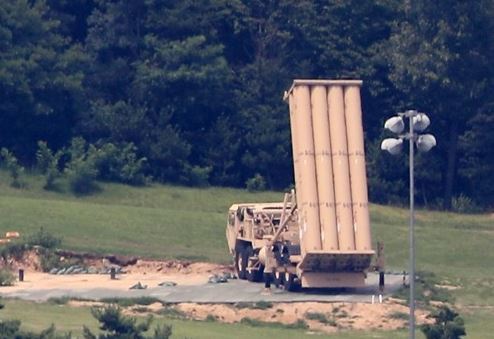US 'ready' to install more THAAD launchers: Pentagon
By Catherine ChungPublished : Aug. 1, 2017 - 09:20
WASHINGTON -- The United States is ready to deploy the remaining parts of an advanced missile defense system to South Korea, the Pentagon said Monday with tensions rising over North Korea's latest missile test.
The remark by Pentagon spokesman Navy Capt. Jeff Davis comes three days after North Korea test-fired a second intercontinental ballistic missile, marking a significant step forward in its pursuit of a nuclear-tipped ballistic missile capable of hitting the continental US.
Shortly after the launch, South Korean President Moon Jae-in ordered the "temporary" installation of four additional launchers on the THAAD missile defense system to boost the country's defense capabilities. A THAAD battery is made up of six launchers, but only two have been installed in South Korea pending an environmental impact review.
"We made an alliance decision with the Republic of Korea government last year to deploy THAAD to the Korean Peninsula as a defensive measure," Davis told reporters at the Pentagon. "We have gotten that to an initial missile defense ability just within the past few months."
The remark by Pentagon spokesman Navy Capt. Jeff Davis comes three days after North Korea test-fired a second intercontinental ballistic missile, marking a significant step forward in its pursuit of a nuclear-tipped ballistic missile capable of hitting the continental US.
Shortly after the launch, South Korean President Moon Jae-in ordered the "temporary" installation of four additional launchers on the THAAD missile defense system to boost the country's defense capabilities. A THAAD battery is made up of six launchers, but only two have been installed in South Korea pending an environmental impact review.
"We made an alliance decision with the Republic of Korea government last year to deploy THAAD to the Korean Peninsula as a defensive measure," Davis told reporters at the Pentagon. "We have gotten that to an initial missile defense ability just within the past few months."

The US is standing by to bring in additional elements, and talks on how to do that are ongoing, the captain said. "We are certainly ready to bring additional pieces in as quickly as we can," he added.
THAAD's deployment has met strong protests from China and Russia, which claim it is a threat to their national security, and residents near the site of the battery, who are concerned about the potentially harmful impact of its powerful radar.
"A lot of people question the need for THAAD; they question the requirement for us," Davis noted. "But the North Koreans are being far better spokespeople on that than we're capable of. They're making the case for us rather effectively."
On Friday, the US Joint Chiefs of Staff said its Chairman Gen. Joe Dunford discussed military response options to North Korea's missile launch in a phone call with his South Korean counterpart Gen. Lee Sun-jin. The revelation prompted speculation as to what kind of military response the allies may be considering.
"We are always talking with our allies, and clearly in the face of a threat like this, one of the first things we do is talk to our allies," Davis said. "We in the military are obsessive planners and certainly, in as much as we are talking with our allies, we're always planning as well."
There is nothing to announce, however, and the two sides are "always" looking at military options, he said.
The captain also said the sortie of two B-1B US bombers over South Korea on Sunday was scheduled in advance but moved up by about a day due to the ICBM test.
The show of force was designed to demonstrate the allies' ability to "rapidly deploy very significant firepower through the peninsula in a short period of time," he said.
On recent reports that the allies are in talks to revise South Korea's missile guidelines, Davis declined to comment, saying he is not at liberty to provide details but is certainly aware of the issue. (Yonhap)



![[AtoZ into Korean mind] Humor in Korea: Navigating the line between what's funny and not](http://res.heraldm.com/phpwas/restmb_idxmake.php?idx=644&simg=/content/image/2024/04/22/20240422050642_0.jpg&u=)
![[Exclusive] Korean military set to ban iPhones over 'security' concerns](http://res.heraldm.com/phpwas/restmb_idxmake.php?idx=644&simg=/content/image/2024/04/23/20240423050599_0.jpg&u=20240423183955)


![[Herald Interview] Why Toss invited hackers to penetrate its system](http://res.heraldm.com/phpwas/restmb_idxmake.php?idx=644&simg=/content/image/2024/04/22/20240422050569_0.jpg&u=20240422150649)
![[Graphic News] 77% of young Koreans still financially dependent](http://res.heraldm.com/phpwas/restmb_idxmake.php?idx=644&simg=/content/image/2024/04/22/20240422050762_0.gif&u=)






![[Exclusive] Korean military to ban iPhones over security issues](http://res.heraldm.com/phpwas/restmb_idxmake.php?idx=652&simg=/content/image/2024/04/23/20240423050599_0.jpg&u=20240423183955)



![[Today’s K-pop] Ateez confirms US tour details](http://res.heraldm.com/phpwas/restmb_idxmake.php?idx=642&simg=/content/image/2024/04/23/20240423050700_0.jpg&u=)